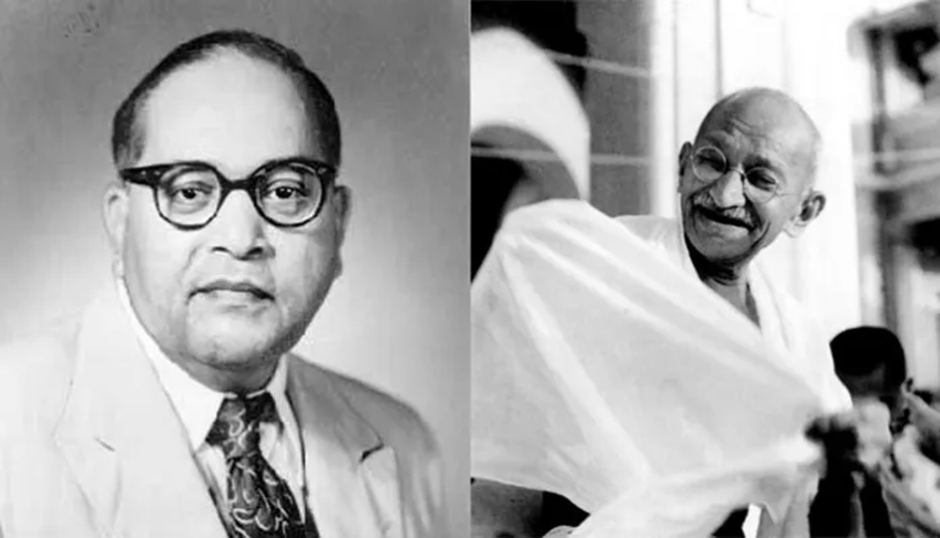- Courses
- GS Full Course 1 Year
- GS Full Course 2 Year
- GS Full Course 3 Year
- GS Full Course Till Selection
- Answer Alpha: Mains 2025 Mentorship
- MEP (Mains Enrichment Programme) Data, Facts
- Essay Target – 150+ Marks
- Online Program
- GS Recorded Course
- Polity
- Geography
- Economy
- Ancient, Medieval and Art & Culture AMAC
- Modern India, Post Independence & World History
- Environment
- Governance
- Science & Technology
- International Relations and Internal Security
- Disaster Management
- Ethics
- NCERT Current Affairs
- Indian Society and Social Issue
- NCERT- Science and Technology
- NCERT - Geography
- NCERT - Ancient History
- NCERT- World History
- NCERT Modern History
- CSAT
- 5 LAYERED ARJUNA Mentorship
- Public Administration Optional
- ABOUT US
- OUR TOPPERS
- TEST SERIES
- FREE STUDY MATERIAL
- VIDEOS
- CONTACT US
Ambedkar and Gandhi: Separate Electorates for Scheduled Castes
Ambedkar and Gandhi: Separate Electorates for Scheduled Castes

In September 1932, Mahatma Gandhi commenced a fast unto death at Yerawada Central Jail in Pune in protest against the British government's award of separate electorates for Scheduled Castes. This confrontation between Gandhi and Dr. B.R. Ambedkar resulted in the Poona Pact, which has had lasting implications for India’s system of reservations and the political landscape concerning caste.
Key Disagreements: Gandhi vs. Ambedkar
1. Philosophical Differences on Caste:
Gandhi's Perspective:
- Gandhi evolved from supporting strict caste norms to rejecting untouchability and advocating for the upliftment of lower castes, whom he referred to as "harijans" (children of God).
- However, he maintained the institution of caste, believing it was part of the social fabric of Hindu society. He viewed the abolition of untouchability as compatible with the existence of caste.
Ambedkar's Perspective:
- Dr. Ambedkar was more radical in his approach. He recognized that caste legitimacy stemmed from the religious texts (shastras) of Hinduism, which justified the hierarchical social structure.
- He argued that true reform required challenging the very foundations of caste and that mere reformist measures would not suffice.
2. Political Strategies:
Ambedkar’s Advocacy for Separate Electorates:
- Ambedkar argued that Scheduled Castes constituted a distinct political community needing separate representation. He proposed separate electorates with a double vote system, allowing them to elect their representatives while also voting in general elections.
- He believed this would empower lower castes politically and enable them to address their grievances effectively.
Gandhi’s Opposition to Separate Electorates:
- Gandhi contended that separate electorates would do little to improve the conditions of lower castes, asserting they should strive for greater political integration and influence rather than being isolated.
- He feared that separate electorates would lead to fragmentation within Hindu society, undermining the collective strength needed to resist British colonial rule.
Context of the Dispute
1. Political and Social Climate:
- The early 20th century was marked by rising tensions between different religious communities in India, particularly Hindus and Muslims. Gandhi was concerned that separate electorates would exacerbate communal divisions and play into British strategies of "divide and rule."
2. The Fast and the Poona Pact:
- Gandhi’s fast, starting on September 20, 1932, placed immense pressure on Ambedkar. While Ambedkar disagreed with Gandhi’s vision of reservations as a political solution, he recognized the potential fallout of Gandhi’s death.
- The resulting Poona Pact allowed for reserved seats for Scheduled Castes in the legislatures but abolished separate electorates, marking a compromise that aligned with Gandhi's views.
Reactions and Legacy
Public Perception:
- Gandhi's fast was celebrated by many as a heroic stand against colonialism and a triumph for unity among Hindus. Figures like Rabindranath Tagore lauded Gandhi’s sacrifice for India’s integrity.
- Conversely, Ambedkar and his supporters viewed the outcome as coercive, with Ambedkar reflecting on the need for more substantive actions against caste discrimination.
Ambedkar’s Later Reflections:
- Ambedkar expressed dissatisfaction with the Poona Pact, criticizing the joint electorate system as a façade that allowed upper-caste Hindus to retain control over the political representation of Dalits. He felt that this would not genuinely empower the oppressed communities.
- In his later writings, Ambedkar condemned the limitations of the arrangements made under the Pact and highlighted the need for more radical changes in society to address caste discrimination effectively.
Conclusion
The disagreement between Gandhi and Ambedkar on the question of separate electorates for Scheduled Castes reflects deeper ideological divides concerning caste, representation, and social justice. The Poona Pact, while a significant compromise, highlighted the complexities of addressing caste issues within the framework of Indian politics. The legacy of this debate continues to influence contemporary discussions on caste, representation, and social justice in India.
Must Check: Best IAS Coaching In Delhi
UPSC Prelims Result 2024 Out: Expected Cut Off & Other Details, UPSC Prelims 2024 Answer with Explanation, Daily Prelims Quiz, Daily Current Affairs, MONTHLY CURRENT AFFAIRS TOTAL (CAT) MAGAZINE, Best IAS Coaching Institute in Karol Bagh, Best IAS Coaching Institute in Delhi, Daily Mains Question Answer Practice, ENSURE IAS UPSC Toppers, UPSC Toppers Marksheet, Previous Year Interview Questions, UPSC Syllabus




